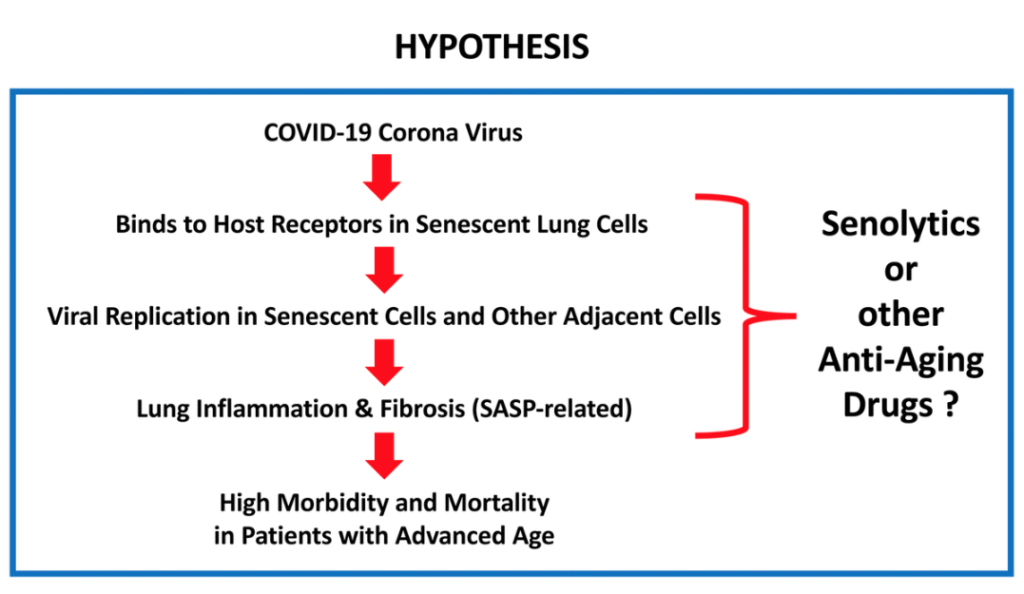Dr. Michael P. Lisanti from The University of Salford describes his 2020 paper published by Aging, entitled, “COVID-19 and chronological aging: senolytics and other anti-aging drugs for the treatment or prevention of corona virus infection?“

Behind the Study is a series of transcribed videos from researchers elaborating on their recent oncology-focused studies published by Aging. A new Behind the Study is released each Monday. Visit the Aging YouTube channel for more insights from outstanding authors.
—
Hi, I’m professor Michael Lisanti and I’m the Chair of Translational Medicine at the University of Salford, and today I want to talk about our new prospective article, which links COVID-19 and chronological aging, and is focused on potential treatments and prevention strategies. I got interested in this topic because there seems to be an association between COVID-19 fatalities and aging, especially in patients with advanced chronological age. Patients over 65, and their 70s and 80s, are more likely to have increased morbidity and mortality. And so, I thought there may be a link there, between aging and senescence and the viral replication, as well as the potential therapy.
What I’d like to highlight about this particular article is that it proposes potential treatment strategies as well as prevention strategies. The reason is because it appears that this disease, the virus itself, may target senescent cells and senescent cells have been rewired to increase protein synthesis and also to increase the secretion of inflammatory mediators, which is known as the SASP, the senescence-associated secretory phenotype.
And so, one idea would be to use drugs that are senolytics. Senolytics are drugs that target and lyse senescent cells, but also to use protein synthesis inhibitors. The reason is because proteins synthesis inhibitors and senolytic drugs would prevent viral replication, which would reduce viral transmission. And so this could be used as a preventative strategy. I’ll just give you a couple of examples. If you have a drug which is an FDA-approved protein synthesis inhibitor, it should inhibit the secretion of inflammatory mediators, like IL-6. It should inhibit the fibrosis by preventing the secretion and production of collagen. And most importantly, the virus is also made of protein, so if you have a protein synthesis inhibitor, it will also inhibit viral replication.

There are three drugs I’d like to mention in particular. One is azithromycin, which is a senolytic. The others are also protein synthesis inhibitors, like doxycycline and rapamycin. All three have been shown to reduce IL-6 production because of their inhibition of protein synthesis activity. And also, all three of them have been shown to inhibit viral replication, not specifically of COVID 19, but since this effect on protein synthesis is a generalized effect, it should work for any virus. For example, azithromycin has been shown to inhibit the replication of Zika virus and Ebola virus, doxycycline has been shown to inhibit the replication of dengue virus, and rapamycin, which is another protein synthesis inhibitor with anti-aging properties, has been shown to inhibit replication of the HIV virus.
So, it seems to me that it’s a no-brainer that we should be repurposing FDA-approved drugs that are protein synthesis inhibitors, both for prevention, to prevent the inflammation fibrosis that’s occurring that’s killing people with COVID-19, and also to prevent the contagion by inhibiting viral replication. So I think this could provide a very inexpensive way forward because drugs like doxycyclin are only less than 10 cents a day, and could be used, as I said, for both prophylaxis and treatment. But, I think we need to use it early in the disease to prevent the fibrosis and inflammation, which makes them long, very inflexible and unable to expand and contract, and leads them to a fibrotic lung disease, which prevents patient recovery and could explain lethality of the disease.
I would like to directly engage with people to pick this up, to bring this forward as potential clinical trials. These clinical trials could be done directly in healthcare workers because they are the most vulnerable. In addition, they could be done in patients with advanced chronological age, or even with patients that are asymptomatic, that have been identified as the virus-positive. And it would be like a window trial where you would do viral titers first, and then you would give the drug and then you could also look at the viral titers after administering the drugs. So this would be a very easy, straightforward trial.
All the diagnostic tools for COVID-19 have already been identified and perfected, so all we need to do is interject FDA-approved drugs, which are protein synthesis inhibitors, to look at the eradication, the virus. So this would also be a very inexpensive clinical trial. But I would like to engage with infectious disease experts and virologists to help facilitate. Thank you.
Of course, I would like to thank two foundations which have supported our work: The Fox Point Foundation in Canada and The Healthy Life Foundation in the UK for providing the equipment and infrastructure at the University of Salford.
Click here to read the full paper, published by Aging.
WATCH: MORE AGING VIDEOS ON LABTUBE
—
Aging is an open-access journal that publishes research papers monthly in all fields of aging research and other topics. These papers are available to read at no cost to readers on Aging-us.com. Open-access journals offer information that has the potential to benefit our societies from the inside out and may be shared with friends, neighbors, colleagues, and other researchers, far and wide.
For media inquiries, please contact [email protected].